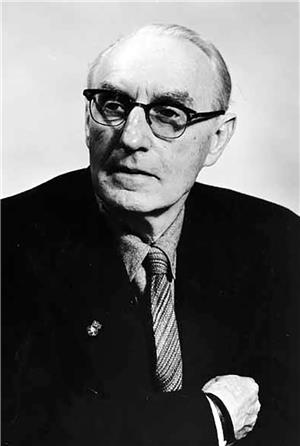This is a recollection of Glenn Hughes by his son, Glenn "Chip" Hughes Jr. Glenn Hughes was author of A History of the American Theater, 1700-1950, and other works, and founded the University of Washington's drama department. He pioneered development of "theater in the round" and guided construction of Penthouse Theatre on the UW Campus in 1940. He also directed the UW's Showboat Theater (now destroyed) and the off-campus University Playhouse, which bore his name until recently.
Glenn Hughes
My memories of my father, Glenn Hughes, derive from my first nine years. Soon thereafter we were separated by my parents’ divorce, and I saw him only a few times again before his death at age 69, when I was 12.
All agree that he was very witty, very smart, very gracious. I was too young to appreciate those gifts. That he was intelligent and a leader I took for granted; after all, he wrote books and was the founder and director of the University of Washington Drama Department. But I knew firsthand that he was the enterprising master of his household, had many close friends and was admired, loved jokes and laughter, enjoyed gardening and, occasionally, a bit of gambling, dressed elegantly when appropriate, was deeply emotional and at times sentimental, had a powerful temper, didn’t suffer fools or incompetence gladly, and, above all, loved his creative work and relied on rock-solid work habits.
For me, the most vivid characteristic of his usual daily life was his disappearance after dinner into his study, where he would work until ten o’clock. Most evenings one could hear from behind the study door the relentless clacking of his typewiter. These were the hours, I presume, when the plays and the books of poetry and of reminiscences that were published during my childhood, as well his voluminous ongoing correspondence and materials related to teaching and departmental administration, were produced. (His last major scholarly work and textbook, A History of the American Theater, 1700-1950, was published in 1951, the year I was born.) Promptly at 10:00, my memory has it, he would stop working. Once I was old enough, I joined him in late evening television watching; he particularly liked Westerns.
His habits concerning dinner were as strict and dependable as his work routine. He was the cook in the family -- an excellent, cosmopolitan, Francophile cook, whose sophisticated palate was imposed on the family as the non-disputable measure of culinary judgment. For this I am very grateful, since it led to my being open to and interested in every type of cuisine. Dinner was served at exactly six o’clock. The invariable signal was the clanging of a string of heavy cow bells that hung in the front door foyer. You could hear them easily throughout the house; and woe to the person who was not sitting at table a few moments later, a promptness well-rewarded, of course, by the quality of the meals.
In the course of my childhood he smoked both pipes and cigars but mainly cigarettes -- Pall Malls and Fatimas, or occasionally Gaulloises. When I was small he took great pleasure in bouncing me and my sister on his knee while singing nursery rhymes and laughing. He sometimes took me fishing, nostalgic, as it seemed to me, for his youth; he began to teach me to shoot, using a .22 rifle.
As he got older he dressed more eccentrically. He loved berets, an affection I’ve inherited. He also wrote poetry at the drop of a hat, for occasions formal and informal, another activity I have happily followed him in, and in which I often feel the continuation in me of his love of words, of drama, and of life.

